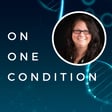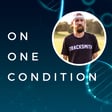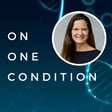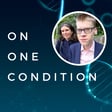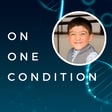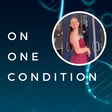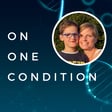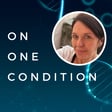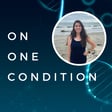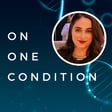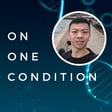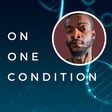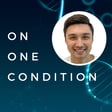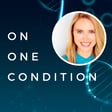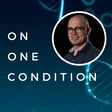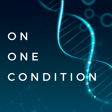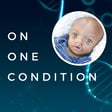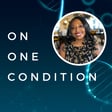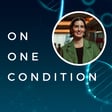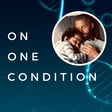Introduction to 'On One Condition' Podcast
00:00:00
Speaker
Hi, I'm Sylvain Berthelot and you're listening to On One Condition, a podcast to raise awareness about health conditions by listening to people who live them every day. My guest today is Kelly Forrester and we're going to talk about wet MD, also known as macular degeneration.
00:00:19
Speaker
Hi Kelly, thank you for joining me on the podcast. How are you? Hi Sylvain, I'm good, thank you. Thank you for having me today.
Living with Wet MD: Kelly's Experience
00:00:27
Speaker
So it's an absolute pleasure because we work together and then you came to me to share about WetMD and yeah, it's a pleasure to do that together. Yeah, thank you. It's not really a condition I talk a lot about, but I love your podcast and i always enjoy listening to them. So thanks for having me.
00:00:49
Speaker
It's nice to hear. ah So I love starting with the songs. Which song did you choose and why? So I chose a song by Lauren Daigle and Aiden King. I think that's the way they say his name. It's a song called Time and I'm a person of faith, but it's a song that even if you aren't a person of faith, it it reminds us how small we are in the big picture of things and that things happen good and bad to good and bad people.
00:01:21
Speaker
And so it's not really, Why has this happened to me or why do bad things happen in my life? It's more, how do I get through them? And okay, it is what it is.
00:01:32
Speaker
Let's just be able to rise to the occasion, realizing that we're not in control and that our job is really just the journey. So it's just a really uplifting song for me because it again, it reminds me that I'm not in control and that's a powerful feeling to realize that you don't have any control.
00:01:53
Speaker
I agree with you. And it's it's actually difficult sometimes to go past the lack of control. But actually, once you once you accept it, makes you realize that, ka what can I actually do?
00:02:10
Speaker
Absolutely. Yeah. and i It's a hard thing to embrace. But once you do it, you're right. The hardest part of the journey is past. Yeah. You start with a very strong message already.
00:02:23
Speaker
ah So let's start from the beginning, if
Diagnosis Journey at Age 55
00:02:27
Speaker
you don't mind. So how did you realize that you have wet MD? I was really lucky in my life in the fact that I did not require glasses, reading glasses until I was 50.
00:02:42
Speaker
And so I guess we're going to talk about age in this podcast because it does affect those typically over 50. So at 50, shocked to get glasses, but It's a minor inconvenience to be able to see clearly.
00:02:57
Speaker
And at about the age of 55, I noticed that as each year progressed and the prescription progressed, they weren't really resolving some vision issues that I was having in my left eye.
00:03:11
Speaker
And on a routine exam where they go in and do all of the different testings, when you go to get new prescriptions and glasses, they noticed a bump on my retina. And so the recommendation was made to simply go and have it checked out.
00:03:27
Speaker
I pushed for more information before I left the office and was told that it could be macular degeneration. And because I have friends and colleagues that have gone through the same um disorder, I knew a little bit about it, but I really dove into the research. I'm sort of that person that If you tell me there's something I'm going to encounter and I don't know anything about it, I'm going to research it either teach what I can find ah Dr. Google of sorts.
00:03:58
Speaker
So I found a doctor in Austin who is a renowned eye surgeon and he confirmed that it was macular degeneration, but it was a neuro atypical macular degeneration because of my age.
00:04:17
Speaker
And because I did not have any family history of this disease, that's sort of how it all came about and how I started. My first consultation resulted in an eye injection, which that sounds really fast and it was very quick. And so the emotions didn't have a chance to catch up to what was happening.
00:04:39
Speaker
And my journey began with eye injections. Was the eye injection to address the macular degeneration?
Effects and Management of Wet MD
00:04:50
Speaker
The diagnosis is atypical neovascular AMD with active CNV, and then a secondary foveomacular, the teleform dystrophy.
00:05:03
Speaker
All that really means is that there is a type of macular degeneration causing an impairment on my retina. And so it results in eye fatigue and blurriness that can be a little bit of a hindrance as the day wears on.
00:05:22
Speaker
But the long-term effect of what is happening in my left eye, I think has been something that I've really had to put my arms around and again, realize I'm not in control and how do I deal with this?
00:05:35
Speaker
Because the long-term effect is that I may lose my center vision. And although you think, well, you'll still have your peripheral, losing your center vision, it keeps you from reading properly and seeing the words on a page.
00:05:50
Speaker
And when my eye is tired, I am that person that has to go to my phone and use the camera function to blow up the reading in order to see what I'm reading. I'll lose the ability to recognize sharp images and faces, facial features.
00:06:07
Speaker
So if you imagine looking at me on camera, at my face and all you can see is my forehead and you're cutting out my mouth and nose and perhaps, you know, my eyes, if you're looking at me, you lose the ability to to see who you're, you're looking at, who you're staring at.
00:06:26
Speaker
So that's the longterm effect. There's not really a way to cure what is happening, but there is a way to mitigate it and slow it down.
00:06:37
Speaker
And so far I've, I've responded positively for the most part, since I started this journey. Two years ago. It was two years ago over the summer. so Okay.
00:06:48
Speaker
So do you still have your right eye where you don't have ah MD? Do you lose complete center vision? or is it Because my brain is relying on that right eye. The right eye is weakening at a quicker rate than it would if I were just growing older into my 70s and 80s.
00:07:09
Speaker
So the right eye is having to work double time. The prescription and the eyes are a little bit different. Whereas, you know, I have to get stronger reading glasses or even long distance glasses. I'm not one that will wear the progressives, but I'll have to continue to get stronger and stronger in both eyes as the disease sort of takes over.
00:07:33
Speaker
Thinking, you know, in your mid fifties that you may lose your eyes prematurely, it does a number on you because in my profession and in my life, As we all are, I don't think we think about our site every day.
00:07:47
Speaker
I think that it's one of those things that we easily take for granted until it's compromised. The thought of not being able to see in 10, 15 years, i now I'm guessing at that number because there's really no way to forecast when or how it will affect you.
00:08:07
Speaker
It can be overwhelming if I still think I'm in control. And I still try to walk through my life as if vision is not an issue. Well, yeah, I can imagine.
00:08:20
Speaker
You really only realize how much sight is crucial to what we do when you're at risk of losing it, I guess.
00:08:31
Speaker
Yeah, and it's not one of those diseases that's life-threatening, but it's definitely life-altering because of what I've chosen to do as a profession and being on the computer most of the day, um you know, that takes a play in it as well. It it can tire the eye quicker throughout the day.
00:08:50
Speaker
So I have to take lots of breaks just to get away from the screen colors and the lights. and Okay. And you said that it's usually associated with age. So do you know why it's come early for you?
Exploring Causes of Atypical Wet MD
00:09:05
Speaker
Well, so it's usually associated with age when it is the typical one of two wet or dry macular degeneration, because mine's atypical and not associated with either side of the disorder disease.
00:09:21
Speaker
It can be a variety of things. The three things that are highlighted when you learn about this our smoking history, what you eat and the fatty foods that we consume when we're younger.
00:09:35
Speaker
as well as genetics and genetics don't play a factor in mine. For a short time in college, I thought I was cool and tried to smoke. So do I know if that's actually played a part in this?
00:09:51
Speaker
The doctors say no, because I wasn't a long-term smoker and a heavy smoker. Then it was food intake. Well, I was a swimmer and an athlete, so that didn't really come into play either.
00:10:04
Speaker
But when I told my physician that I was a swimmer, he said the sun could have done some of this damage as well. So in my left eye, I have the vascular vessels and behind your retina that mine are leaking.
00:10:20
Speaker
And so that fluid really has nowhere to go. So it creates a bubble, if you will. So when I get these eye injections, which are In the beginning, they were every four to six weeks, and now we're up to 12 weeks, which means the medication is working, the vessels are not leaking as much, and they're stronger. They're able to hold that fluid. That's not a good thing because it's that bump that takes your vision away on your retina.
00:10:50
Speaker
But the medication is really helping slow this condition down for me. So the sun damage, you know, being a swimmer, All the summers that we were outside swimming in the pool and all of the meets, all the, you know, eight to 10 hour days in the sun, if you will, in the heat of the summer in North Texas, all of that took a ah toll.
00:11:12
Speaker
Again, it's atypical, so how do you link it back to you know where it began? There's not a family history of this for me. No. I'm intrigued.
00:11:22
Speaker
and I don't know if I want to learn more, actually, about the eye injection. To me, it sounds like a difficult to experience. okay I think the first time it was more emotional. you know you're You're afraid. You're scared. You're not really sure what you're getting into.
00:11:41
Speaker
But my doctor is fantastic. He's very young. He's on the cutting edge of medicine and the eye. He's amazing. So he makes the process as painless as possible. There are three layers of lidocaine that are put into your eye over a 15, 20 minute time period, and then a layer of betadine to prevent any infection.
00:12:05
Speaker
And for about four hours after the injection, there's a perfectly sized hole, perfectly circled in my vision that that's where the vessels, if they should bleed, if he hits a vessel, there's a perfect hole in my vision for about four to six hours.
00:12:26
Speaker
And so it the eye heals very quickly in that respect, just like most things on our head. It's quite a phenomenon. By the time he tells me to look at his left ear with my left eye and I turn my head to do it. He's come in from behind and he's in and out very, very quickly, but it's a 22 gauge needle.
00:12:48
Speaker
And you know, when you see something like that coming towards your eye, yeah, there's a bit of apprehension, a little bit of fear, but I've gotten really used to it but having done it so many times now.
00:12:59
Speaker
Yeah. Well, not for me. Not for most, and that is I wouldn't have chosen it, that's for sure. Yeah. And do you know if there's any other treatment available, or is this the only one that that works? So Lasix can sometimes help, but mine is not of the type that that will help.
00:13:20
Speaker
They have done retina implants. There's all kinds of eye surgeries that are still I think in the investigational stage, there are several medications. There's 24 medications on the market and such as our insurances, you start with the one with the lowest response before they'll allow you to continue to go up and up and up in the medications. And the reason for that is because of the cost.
00:13:49
Speaker
Each injection that I get today is about $2,000 injection. And so insurance is not happy and jumping on board to pay for all of this unless it's absolutely necessary. So you start with the medications, you know, you won't have high response to in order to get to the next level. And I'm finally at a level medication. I think the response is a 10, one out of one out of 10, it's a
Insurance Challenges in US Healthcare
00:14:14
Speaker
So I'm on the right medication. It's called PavBlue. You may see the commercials all the time for eye injections and and right now, what AMD is a large topic.
00:14:26
Speaker
There's a lot of attention being paid to it because there's a lot of research going on. And because we're in that field, it's sort of rewarding to think the research they're collecting, even on me for, you know, the visits and the injections, et cetera, that it's being used for greater good.
00:14:47
Speaker
Yeah. Yeah. Has it changed at all the way you look at clinical trials? Yes, it has. Yeah. Very much so. and And, you know, when we're younger and we get into this industry and I started in a phase one clinic and in phase one, as you know, most of the subject population is given a stipend.
00:15:09
Speaker
They're paid to come in and do the research. So it was quite interesting to in my twenties when I got into this industry, but yeah, it does. It gives me a whole different appreciation for what we do.
00:15:25
Speaker
We work on such a small piece in research that we don't really see how it's amplified out into the process. I mean, the process is so complicated.
00:15:38
Speaker
It's so I think layered. And so to realize that the medications we work on can help people that work in this industry, even me, it's rewarding to know that we do what we do.
00:15:52
Speaker
Yeah. Yeah. I agree. Going back to what you said about insurances.
00:15:59
Speaker
yeah wait I don't know if it's a hot topic or not, but it's the second or third time in a recent ah period where insurances are the topic to to discuss. So is it recent that it's difficult to navigate or is it always been the case for the US? Yeah.
00:16:26
Speaker
I don't think it's always been the case for the US and, you know, playing devil's advocate for those that sit the side of insurance being hard to acquire and to keep, even if they can afford it.
00:16:42
Speaker
one side of our population, I think insurance is not readily available today. I have such a limited view of that because I've been very fortunate. And as long as I've worked, I've had insurance because I've worked full time for companies that provide that as part of their benefit package.
00:17:01
Speaker
And so not that it's taken for granted, but you sort of forget that not everyone has the same positive experience with insurance. And I've been healthy most of my life and not required insurance for many things past yearly checkups, dental visits, eye exams, the sort of thing we always do proactively.
00:17:26
Speaker
I've never been treated or had surgery that required insurance to kick in. So I was really naive, I think, when I entered this arena around what insurance will and will not cover, especially when the need is clear and the diagnosis has been documented well.
00:17:46
Speaker
Without getting political, our insurance industry today could use some cleanup. I think that's a good way to put it. So for those that can afford insurance, which I think is not, it used to be that we thought everyone that worked had insurance.
00:18:03
Speaker
It's not the case today. And then for those that don't have insurance provided as part of a employment benefit package, most can't afford easily the insurance that they have that just covers basic needs.
00:18:19
Speaker
And so i think insurance is a big topic because it's being politicized. Yeah, it's difficult to grasp, actually, from like yeah having lived in in France and in the UK most of my life.
00:18:35
Speaker
I've always lived in a world where no matter, well, to a certain extent extent, but if you need medication, most of it comes without too much out of your pocket.
00:18:49
Speaker
If you go to the hospital in the UK, you don't necessarily need to pay anything. And And we don't question that. Whereas if you have to pay for an exam, then i can imagine that in some circumstances, you may question if you need to go to that exam or not.
00:19:10
Speaker
I think the first time I've ever been shocked at medication costs, and certainly my eye medication was an eye opener, but just going to the pharmacy to get a basic drug for a pandemic disease, you know, and being told that after insurance, the patient cost, our cost was $485. I think that's the first time I became aware of the overarching abuse of some of that.
00:19:42
Speaker
That's a whole other podcast in itself. You know, is that the pharmaceutical companies that are charging? Is that insurance trying to recoup? Is that, I don't know, lack of infrastructure for our insurance industry, i think it's probably a bit of all and a much more complicated response and answer.
00:20:03
Speaker
Yeah, yeah, agree. Yeah, we're not going to change the system. Not today. Not from behind our desks. Not today.
Risk and Lifestyle Adaptations
00:20:12
Speaker
so going back to WetMD, so it's only on your left eye at the moment. and Is there any risk of it moving to your right eye as well?
00:20:23
Speaker
Certainly there, there could be, but with all the, the testing I haven't, my eyes haven't mimicked the same weak vessels. Why? i don't know. They, you know, that's the one part of this disease that I think there's still so many questions around.
00:20:41
Speaker
My first question was seriously at my age, how is this happening? I'm the youngest person in the waiting room. I can tell you that at the doctor's office. and probably the only working person in the doctor's office for this condition.
00:20:55
Speaker
So it was kind of comical in some sense, but it is what it is. And I'm not sure again, it's a great reminder, the song time that the wise, you're not always going to have your answers. And even if you did, what benefit does that gain you? You're still dealing with the disorder, with the disease.
00:21:14
Speaker
Yeah, yeah, yeah. And does it affect anything at the moment? Like, does it stop you from doing anything, like driving, for example? Not driving.
00:21:25
Speaker
and don't drive at night anymore because I can't clearly read the signs. Nighttime driving is difficult. So that stopped, I guess, about a year ago when I realized I was really tasking my site to drive at night.
00:21:41
Speaker
Certainly reading menus and but computer screens at the end of a long day, those things are affected. I now wear sunglasses a whole lot more just to be able to have great vision when I'm out in the sun.
00:21:58
Speaker
I'm an outdoors person. You know that. I'm outdoors every single chance I can get in a day. It doesn't matter the weather. And so I really have to think about those things now. So those are inconveniences.
00:22:11
Speaker
I don't think those are the things that I worry about. The things I worry about are truly losing the center vision and the crystal clear sight in that left eye.
00:22:23
Speaker
So much so that on my way home from my appointments, I wear an eye patch to give the eye an opportunity to rest after the injection. It seems to quicken the healing for the day.
00:22:36
Speaker
Typically in the beginning, i would not work. for the rest of the day, just to take a nap and let my eye rest. But now I've realized that if I put an eye patch on pretty quickly, three, four hours and I'm good to go.
00:22:49
Speaker
So I would play a game with myself, obviously very mental, driving home, wondering how I would navigate the rest of my life with that eye patch on if that i truly was lost.
00:23:05
Speaker
And it was very difficult. It's quite a realization to realize how much we need both of our eyes. Oh yeah, especially for driving. Absolutely. I can't imagine driving with just one eye. I would find it very difficult. i stayed in the slow lane.
00:23:19
Speaker
I didn't make very many left-hand turns because I couldn't you know crane my neck around enough to see oncoming traffic. So it definitely changes your path. Yeah, yeah, yeah.
00:23:32
Speaker
So when we were talking about your condition, you shared that you're aware of two new drugs that are going to be released by the FDA?
Hope in New Treatments
00:23:45
Speaker
So there are two new drugs. the names which are incredibly long to pronounce, but there are two new drugs that the FDA is about to release. And I'm really excited about those just because even if I'm already using a medication that I'm responding to very well, but there are so many out there and I've learned sitting in the doctor's office that not everyone reacting and getting the benefit from these drugs. You know, our bodies are all very unique and very different. So,
00:24:18
Speaker
There are people that are older than me, but that they have yet to get those positive results and they are slowly losing their sight. So when you see these people in the office visit after visit, because we're all pretty much on the same schedule, depending on when we, or how we respond. Again, I'm able to go 10 weeks now where there was a time where I was going every four weeks. I wasn't responding.
00:24:45
Speaker
It's exciting to know that there is still research being done on this disorder and that they're not just accepting it as an old person's or an older person's disease. So, yeah, that really did excite me to know that the FDA is still very much involved in the improvement of this disorder and that there are researchers that are very committed to it.
00:25:09
Speaker
Yeah, and that's true that you take it for granted that one treatment should work for everyone, but it doesn't. It doesn't. No, unfortunately it doesn't. I went through four different drugs before we landed on.
00:25:22
Speaker
and The only way I know how to describe the the difference in the drugs is the cost. So before we landed on the most expensive drug, i went through four different ones and and wasn't getting the same response. So really, really happy for the companies that are,
00:25:37
Speaker
still very heavily invested in ophthalmology. Yeah. Do you know if those new treatments are injections still? They are injections. They are? Okay. It seems to be the quickest route to get the medication to those vessels.
00:25:53
Speaker
In addition to the injections, I take eye vitamins that are over the counter and I keep eye drops in my eyes several times a day just to give the eye some relief.
00:26:05
Speaker
I've learned a lot about the eye. I was never interested in the eyes. Anatomy wasn't my thing. And it's certainly not the eye. It's been a shift in my focus for sure. Yeah.
00:26:18
Speaker
How do you keep informed of new releases like this? I'm always curious about that. Well, I think I'm, and again, a product of our industry. So I read a lot and I subscribe to publications that are industry bound for research. And so I'm always keeping my reading open to looking for those ophthalmology drugs and and those companies that are investing in those drugs.
00:26:48
Speaker
I'm fortunate that I know of those publications as do you. And we're fortunate that we work in an industry that we have resources that I think the general population doesn't even know exists.
00:27:01
Speaker
Yeah, I agree. Or you rely on your doctors, but they don't necessarily always have the the time to keep track of all the new treatments are that are being tested.
00:27:14
Speaker
That is absolutely very true. Well, I have one last question for you.
Finding Peace in Nature
00:27:19
Speaker
And I can't wait to to hear your answer. oh What's your happy place, place where you feel at peace?
00:27:27
Speaker
So my happy place is in the mountains. So I, you know, you get that that question often, beach or mountains. So mine is in New Mexico.
00:27:40
Speaker
I grew up being very fortunate to go to a family vacation home in Rio Doso, New Mexico. There's something about being in the mountains, communing in nature, again, being reminded of our small existence in a large picture that keeps the world that really fills me up and recharges me.
00:28:02
Speaker
So when I'm feeling depleted, it's a long road trip and it's so worth it. Nice. That makes me want to go. I've always wanted to do a road trip in the US. For me, it's like ah one of the best ways to go for an adventure. So I'll have to do it one day. Well, and I'm lucky I live in a state where it can take 14 hours to get from border to border, north to south or 12, east to west.
00:28:28
Speaker
So being in South Texas outside of Austin, it's quite a ah trip to get go to Rio Doso, I typically break it up in two days. I have done the 12 hour trip straight, but that's not fun.
00:28:42
Speaker
Especially when you want to stop and experience the sights along the way. Yeah, the mountains are my place. That's sort of where I feel my smallness, which makes me realize my power.
00:28:55
Speaker
And it's just a place that I can recharge. Get some nice rest and a local brewery never hurts. I fully agree with that.
Conclusion and Reflections
00:29:11
Speaker
Well, thank you, Kerry. I love how you started with this song, Time, and mentioning that it's important to realize what you can control and can't control.
00:29:23
Speaker
And throughout our discussion, you made me feel like you have a certain wisdom about what's happening to your eye and how you approach it.
00:29:36
Speaker
think it's the right way of looking at it. Thank you. It's an evolution. can come that way. lot of trial and error, but hopefully as humans and adults, we learn and grow. And as we know better, we do better.
00:29:53
Speaker
Yeah. It's been lovely talking to you. Thank you so much for sharing about WetMD. I'm sure I'll talk to you soon. Thank you.

